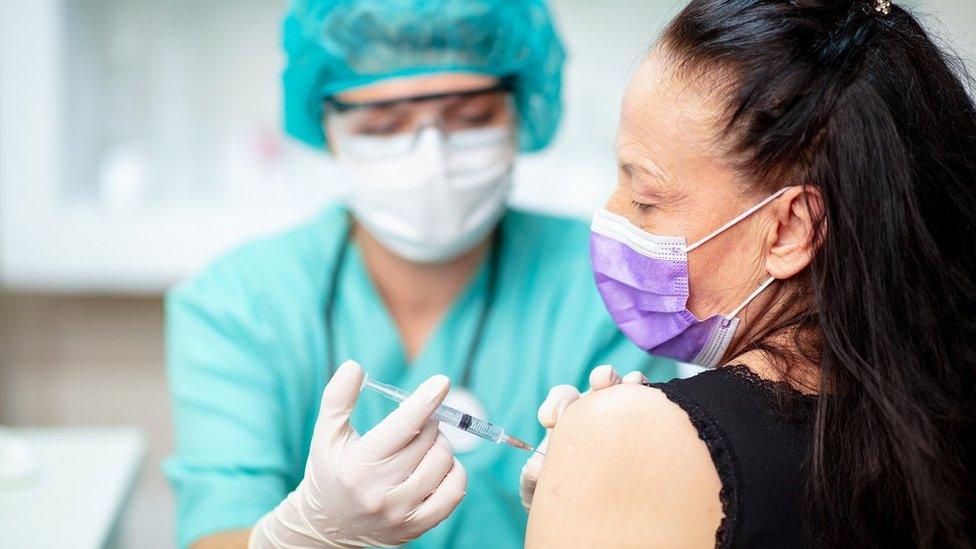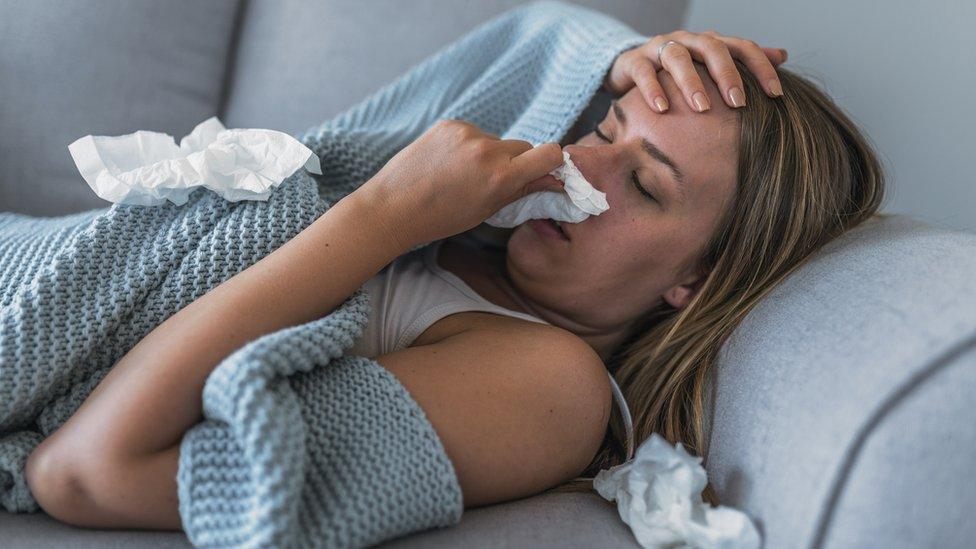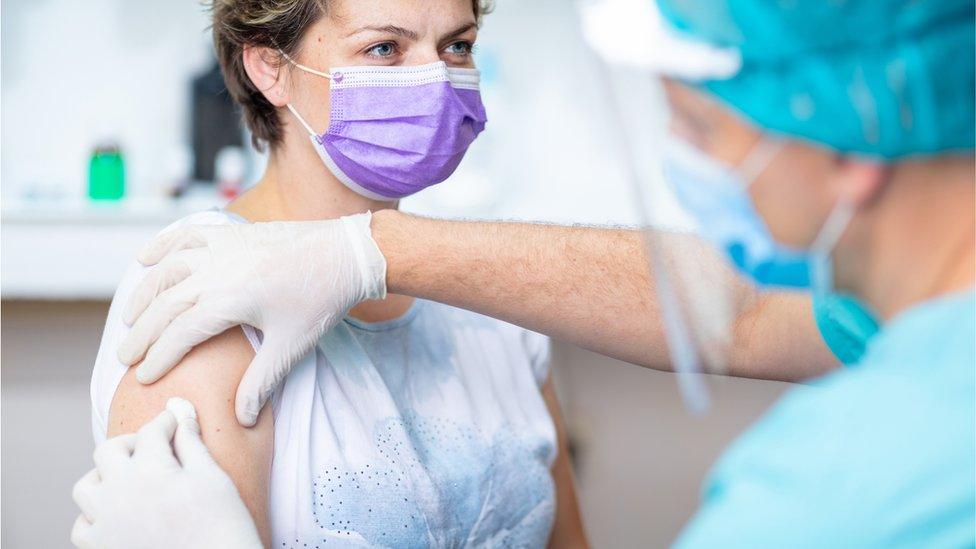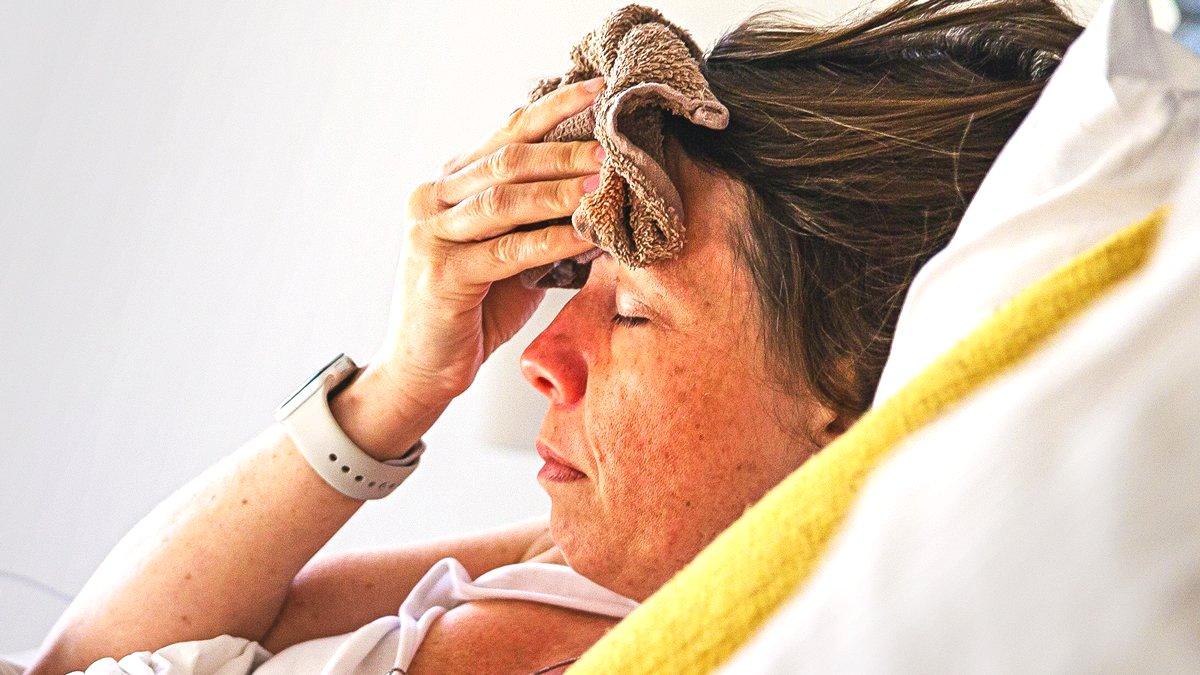Covid-19: Flu jab push as Covid vaccine roll-out planned
- Published
- comments

People aged over 50 in England are being urged to get a flu jab, as ministers hope for a mass roll-out of a Covid-19 vaccine next year.
Health Secretary Matt Hancock stressed it was "more important than ever" for people to get a flu jab to fight the "twin threats" of coronavirus and flu.
He said the NHS was preparing to roll out a Covid vaccine if one is approved.
It comes as 30 million people are being offered a flu jab in England's largest flu-immunisation scheme to date.
People aged 50 to 64 will be eligible for the vaccine from 1 December.
Mr Hancock and Prof Stephen Powis, the national medical director of NHS England, will speak at a Downing Street briefing later.
The health secretary told BBC Breakfast earlier that all over 50s would be able to get the vaccine by January.
He also said that Christmas wouldn't be "fully normal" this year, adding there would "have to be rules to keep the virus under control" which ministers were still working on.
London's Metropolitan Police Commissioner Dame Cressida Dick has said the force has "no interest in interrupting family Christmas dinners" to catch Covid-19 rule breakers and will work with whatever government restrictions are in place at the time.
Mr Hancock added that while 2020 had been "a difficult year" there were signs England's current lockdown - which is expected to end on 2 December - was working.
"There are promising signs that we have seen a flattening of the number of cases since lockdown was brought in and that is good news, though clearly there is further to go," he told BBC Radio 4's Today programme.
However Tory MP Steve Baker, deputy chair of the Covid Recovery Group - which was set up to oppose future national lockdowns - urged Mr Hancock to correct his statement to "avoid any damaging misunderstandings about the interpretation of data".
He said: "Government scientists briefing MPs were clear this week that the effects of lockdown would not be visible in the data until this weekend. Cases may have flattened since lockdown but any change is not yet because of lockdown."

THE R NUMBER: What it means and why it matters
FACE MASKS: When do I need to wear one?
SUPPORT BUBBLES: What are they and who can be in yours?
TEST AND TRACE: How does it work?

Prof Calum Semple, who sits on the government's Sage committee and the New and Emerging Respiratory Virus Threats Advisory Group (Nervtag), said there was reason for optimism that England's lockdown would have pushed case numbers to a low level before Christmas.
He said there was "encouraging evidence" in the north-west of England with "a plateauing of cases in the community and a slight downturn" in Covid hospital admissions.
He added this gave "great optimism that, with lockdown on top, we will be seeing overall numbers in the country driven down", though he acknowledged that some areas were still in a "very difficult situation" with rising cases.
Meanwhile, Mr Hancock said there would be a programme of Covid-19 vaccinations after recent "promising news" from the Oxford-AstraZeneca and Pfizer-BioNTech vaccine trials.
Asked if he knew from what date people might be able to get a Covid-19 jab, he said: "We don't know if we'll be getting coronavirus jabs yet, but we have had two weeks of promising news...so we are preparing the roll-out."
He added: "The likely big numbers - if it comes off - will be next year for a Covid vaccine, but we still hold out the hope that we might get some going in December this year."
A cold, flu or coronavirus - which one do I have?
Mr Hancock said volunteers were currently being trained to take part in the vaccination programme, which will be led by the NHS.
"We've changed the law to change the number of clinically qualified people who can vaccinate because this is going to be one of the biggest civilian projects in history."
He said the "deep freezers" were already "stabilising over the last few weeks" in order to be ready for the Pfizer vaccine, which needs to be stored at -70C, and confirmed the NHS would have "access to any resources of the state they might need" to assist with the mass administering of vaccines.
It comes as talks are underway between the government and Derby city council over the possibility of using Derby arena as a mass coronavirus vaccination centre - one of a number expected to be needed across the country.
Peter Openshaw, professor of experimental medicine at Imperial College London, said he was "pretty sure" the logistical hurdles in delivering any Covid-19 vaccine on a mass scale could be overcome.
He told Today the UK would have enough cold storage to keep vaccines secure if required, adding that bulk stocks could be kept in "ultra-cold freezers" in hospital departments, and then sent out to GP surgeries where they would then be refrigerated.
A big flu season combined with coronavirus could overwhelm hospitals - especially if many NHS or care-home staff are off sick with flu.
And there is some evidence that a double infection, of Covid-19 and flu together, could be more deadly than getting either single virus.
Flu - or influenza - is a very common, highly infectious disease caused by a virus.
It can be deadly - particularly for older adults, very young children and people with underlying health conditions.
Should I get a flu jab this winter?
The Department of Health said GPs, NHS trusts and pharmacists could order more doses of the flu vaccine to accommodate the extra age group, from a centrally-secured government supply.
The other groups of people already eligible for a free flu jab in England are:
Those aged 65 or over
Pregnant women
People with some medical conditions, external, including diabetes, heart failure and asthma
NHS and social care workers
All children up to Year 7
People who were required to shield from coronavirus - and anyone they live with
As health is a devolved issue, Scotland, external, Northern Ireland, external and Wales, external are running separate flu vaccination campaigns.
England's deputy chief medical officer, Prof Jonathan Van-Tam, urged everyone who is eligible for the flu vaccine "to book their appointments as soon as they can" as the jab remained a "critical tool" to prevent severe illness and potential hospitalisation for thousands of people.
In the autumn, some pharmacists and GP surgeries had to limit flu jabs to the most at-risk groups due to increased demand.
In other developments:
Infection rates are levelling off in England and Scotland and decreasing in Wales and Northern Ireland, latest data from the Office for National Statistics suggests
Sage said the reproduction number - or R value - for the whole of the UK had dropped to between 1 and 1.1, external
Carers looking after people at home will be able to access weekly coronavirus tests from Monday, the Department of Health and Social Care (DHSC) has said, external

HOW TO VACCINATE THE WORLD: A brand new podcast exploring the global race to create a vaccine to end the Covid-19 pandemic
NEW DRAMA 'INDUSTRY': Colleagues, lovers or enemies? Escape with this stylish new drama directed by Lena Dunham

- Published5 April 2022

- Published22 September 2020

- Published2 November 2022
